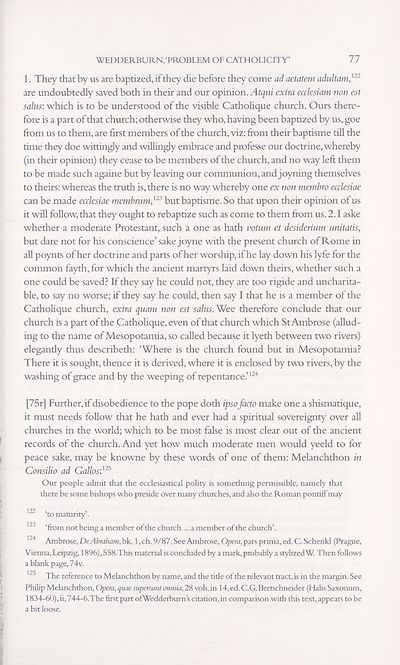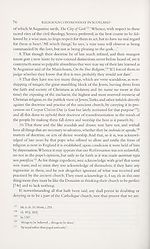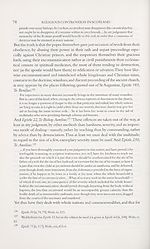Series 5 > Religious Controversy in Scotland 1625-1639
(92) Page 77
Download files
Complete book:
Individual page:
Thumbnail gallery: Grid view | List view

WEDDERBURN,‘PROBLEM OF CATHOLICITY’
77
1. They that by us are baptized, if they die before they come ad aetatem adultam,'22
are undoubtedly saved both in their and our opinion. Atqui extra ecclesiam non est
solus: which is to be understood of the visible Catholique church. Ours there¬
fore is a part of that church; otherwise they who, having been baptized by us, goe
from us to them, are first members of the church, viz: from their baptisme till the
time they doe wittingly and willingly embrace and professe our doctrine, whereby
(in their opinion) they cease to be members of the church, and no way left them
to be made such againe but by leaving our communion, and joyning themselves
to theirs: whereas the truth is, there is no way whereby one ex non membra ecclesiae
can be made ecclesiae membrum,ni but baptisme. So that upon their opinion of us
it will follow, that they ought to rebaptize such as come to them from us. 2.1 aske
whether a moderate Protestant, such a one as hath votum et desiderium unitatis,
but dare not for his conscience’ sake joyne with the present church of Rome in
all poynts of her doctrine and parts of her worship, if he lay down his lyfe for the
common fayth, for which the ancient martyrs laid down theirs, whether such a
one could be saved? If they say he could not, they are too rigide and uncharita¬
ble, to say no worse; if they say he could, then say I that he is a member of the
Catholique church, extra quam non est solus. Wee therefore conclude that our
church is a part of the Catholique, even of that church which St Ambrose (allud¬
ing to the name of Mesopotamia, so called because it lyeth between two rivers)
elegandy thus describeth: ‘Where is the church found but in Mesopotamia?
There it is sought, thence it is derived, where it is enclosed by two rivers, by the
washing of grace and by the weeping of repentance.’124
[75r] Further, if disobedience to the pope doth ipso facto make one a shismatique,
it must needs follow that he hath and ever had a spiritual sovereignty over all
churches in the world; which to be most false is most clear out of the ancient
records of the church. And yet how much moderate men would yeeld to for
peace sake, may be knowne by these words of one of them: Melanchthon in
Consilio ad Gallos:'25
Our people admit that the ecclesiastical polity is something permissible, namely that
there be some bishops who preside over many churches, and also the Roman pontiff may
122 ‘to maturity’.
123 ‘from not being a member of the church... a member of the church’.
124 Ambrose, De Abraham, bk. 1, ch. 9/87. See Ambrose, Opera, pars prima, ed. C. Schenkl (Prague,
Vienna,Leipzig, 1896), 558.This material is concluded by a mark,probably a stylizedW. Then follows
a blank page, 74v.
125 The reference to Melanchthon by name, and the tide of the relevant tract, is in the margin. See
Philip Melanchthon, Opera, quae supersunt omnia, 28 vols. in 14, ed. C.G. Bretschneider (Halis Saxonum,
1834-60), ii,744-6.The first part ofWedderburn’s citation, in comparison with this text, appears to be
a bit loose.
77
1. They that by us are baptized, if they die before they come ad aetatem adultam,'22
are undoubtedly saved both in their and our opinion. Atqui extra ecclesiam non est
solus: which is to be understood of the visible Catholique church. Ours there¬
fore is a part of that church; otherwise they who, having been baptized by us, goe
from us to them, are first members of the church, viz: from their baptisme till the
time they doe wittingly and willingly embrace and professe our doctrine, whereby
(in their opinion) they cease to be members of the church, and no way left them
to be made such againe but by leaving our communion, and joyning themselves
to theirs: whereas the truth is, there is no way whereby one ex non membra ecclesiae
can be made ecclesiae membrum,ni but baptisme. So that upon their opinion of us
it will follow, that they ought to rebaptize such as come to them from us. 2.1 aske
whether a moderate Protestant, such a one as hath votum et desiderium unitatis,
but dare not for his conscience’ sake joyne with the present church of Rome in
all poynts of her doctrine and parts of her worship, if he lay down his lyfe for the
common fayth, for which the ancient martyrs laid down theirs, whether such a
one could be saved? If they say he could not, they are too rigide and uncharita¬
ble, to say no worse; if they say he could, then say I that he is a member of the
Catholique church, extra quam non est solus. Wee therefore conclude that our
church is a part of the Catholique, even of that church which St Ambrose (allud¬
ing to the name of Mesopotamia, so called because it lyeth between two rivers)
elegandy thus describeth: ‘Where is the church found but in Mesopotamia?
There it is sought, thence it is derived, where it is enclosed by two rivers, by the
washing of grace and by the weeping of repentance.’124
[75r] Further, if disobedience to the pope doth ipso facto make one a shismatique,
it must needs follow that he hath and ever had a spiritual sovereignty over all
churches in the world; which to be most false is most clear out of the ancient
records of the church. And yet how much moderate men would yeeld to for
peace sake, may be knowne by these words of one of them: Melanchthon in
Consilio ad Gallos:'25
Our people admit that the ecclesiastical polity is something permissible, namely that
there be some bishops who preside over many churches, and also the Roman pontiff may
122 ‘to maturity’.
123 ‘from not being a member of the church... a member of the church’.
124 Ambrose, De Abraham, bk. 1, ch. 9/87. See Ambrose, Opera, pars prima, ed. C. Schenkl (Prague,
Vienna,Leipzig, 1896), 558.This material is concluded by a mark,probably a stylizedW. Then follows
a blank page, 74v.
125 The reference to Melanchthon by name, and the tide of the relevant tract, is in the margin. See
Philip Melanchthon, Opera, quae supersunt omnia, 28 vols. in 14, ed. C.G. Bretschneider (Halis Saxonum,
1834-60), ii,744-6.The first part ofWedderburn’s citation, in comparison with this text, appears to be
a bit loose.
Set display mode to:
![]() Universal Viewer |
Universal Viewer | ![]() Mirador |
Large image | Transcription
Mirador |
Large image | Transcription
Images and transcriptions on this page, including medium image downloads, may be used under the Creative Commons Attribution 4.0 International Licence unless otherwise stated. ![]()
| Scottish History Society volumes > Series 5 > Religious Controversy in Scotland 1625-1639 > (92) Page 77 |
|---|
| Permanent URL | https://digital.nls.uk/127329069 |
|---|
| Description | Over 180 volumes, published by the Scottish History Society, containing original sources on Scotland's history and people. With a wide range of subjects, the books collectively cover all periods from the 12th to 20th centuries, and reflect changing trends in Scottish history. Sources are accompanied by scholarly interpretation, references and bibliographies. Volumes are usually published annually, and more digitised volumes will be added as they become available. |
|---|


